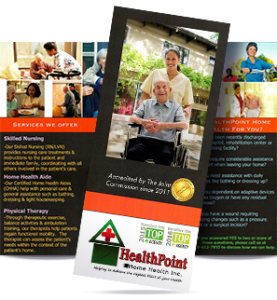FAQ
What are the requirements to be eligible for home health services?
- Answer: In order to be eligible for Medicare home health benefits, the client:
- Must be under the care of a doctor, and must be getting services under a plan of care established and reviewed regularly by a doctor.
- Must need, and a doctor must certify that the client needs, one or more of these:
- Intermittent skilled nursing care (other than just drawing blood)
- Physical therapy, speech-language pathology, or continued occupational therapy services. These services are covered only when the services are specific, safe and an effective treatment for your condition. The amount, frequency and time period of the services needs to be reasonable, and they need to be complex or only qualified therapists can do them safely and effectively.
- To be eligible, either: 1) your condition must be expected to improve in a reasonable and generally-predictable period of time, or 2) you need a skilled therapist to safely and effectively make a maintenance program for your condition, or 3) you need a skilled therapist to safely and effectively do maintenance therapy for your condition.
- The home health agency caring for you must be Medicare-certified.
- Must be homebound, and a doctor must certify that he or she is homebound. Medicare considers a person homebound if he or she meets both of the following criteria:
- The client needs the help of another person or medical equipment such as crutches, a walker or a wheelchair to leave his/her home OR the client’s doctor believes that the client’s health or illness could get worse if he or she leaves home.
- It is difficult for the client to leave his/her home and he or she typically cannot do so.
- The client’s doctor will decide whether he or she qualify as homebound when they write up the plan of care for the home health benefit. This will depend on the doctor’s evaluation and knowledge of the client’s condition over an extended period of time, not on a daily or weekly basis.
- Note: Leaving home for medical treatment, religious services or to attend a licensed or accredited adult day care center does not put the homebound status at risk. Leaving home for short periods of time or for special non-medical events, such as a family reunion, funeral or graduation, will also not keep you from being considered homebound. Taking an occasional trip to the barber or beauty parlor is also allowed.
- Face to Face Encounter Requirement
- As part of the certification, the client’s doctor must confirm that the client had a face-to-face meeting with the doctor or other provider related to the main reason the client needs home care. This face-to-face meeting must be within 90 days of starting to receive home health care or within 30 days after the client have already started receiving home health care. The physician must specifically state that the face-to-face meeting confirmed that you are homebound and qualify for intermittent skilled care.
- The face-to-face encounter can also be done through telehealth. In certain areas, Medicare will cover examinations done for the client in specific places (doctor’s office, hospitals, health clinics) through the use of telecommunications (such as video conferencing).
- The plan of care and certification will last up to sixty days. If you still need more care after that, the plan of care and certification can be renewed for as many 60-day periods as you need as long as your doctor signs them. A face-to-face meeting is not required for recertification.
- You can continue to receive the home health care benefit for as long as you continue to qualify for home health care. However, the plan of care, which details the care you will receive and the frequency of services, covers no more than 60 days at a time. A new plan of care will need to be approved by your doctor every 60 days for you to continue to receive home health care benefits.
What are the types of home health services Medicare will NOT cover?
- Answer:
- If the client needs more than part-time or “intermittent” skilled nursing care.
- 24-hour a day care at home
- Prescription drugs: To get Medicare drug coverage, you need to enroll in a Medicare Part D plan. You can choose a stand-alone Medicare private drug plan (PDP), or a Medicare Advantage Plan with Part D coverage (MADP).
- Meals delivered to the client’s home
- Homemaker or custodial care services (i.e. cooking, shopping, laundry): Unless custodial care is part of the skilled nursing and/or skilled therapy services you receive from a home health aide or other personal care attendant
What are the goals of home health services?
- Answer:
- To provide all levels of home care service in collaboration with physicians,
thus allowing clients to remain in their own homes.
- To provide a broad base of services with client demand governing the
scope, allowing clients to be involved in establishing, implementing, and evaluating services.
- To maintain clients in their homes as long as possible and provide services in
the least restrictive setting.
- To assist clients in using all restorative methods, tools, and procedures to return clients to their optimal level of function.
- To provide cost‑competitive, quality services.
- To function as a liaison between our clients and available community resources and assist our clients in coping with their needs and problems.
- To provide care coordination and advocacy as necessary to obtain necessary services to allow clients to live safely in their own home as long as possible.


